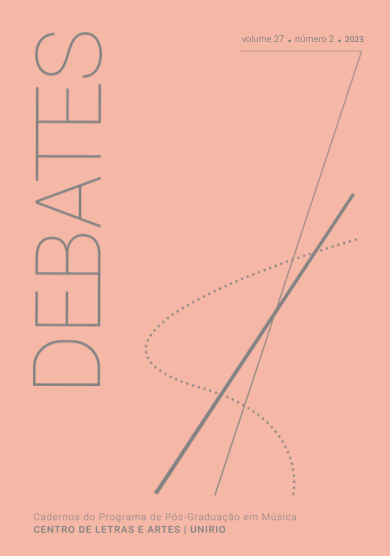Challenges of teaching in higher music education
what is the role of the professor's knowledge?
Keywords:
Music Education, University Pedagogy, Higher Education in Music, Teaching KnowledgeAbstract
This article is the result of a doctoral thesis in Education. The question that guided the study was: which knowledge base predominates among the professors graduated in Music who teach at Music courses at the three São Paulo state universities and which knowledge need to be developed in the search for the quality of teaching in order to overcome a pedagogical action based on the logic of instrumental teaching instead of training that goes beyond learning a particular musical instrument? Supported by the qualitative paradigm, three types of data collection were carried out: online questionnaire, semi-structured interviews, and participant observations. The analysis was based on Bardin's (2011) content analysis assumptions. The theoretical framework was built on the ideas of authors in the field of Education and Music Education, such as Tardif (2014); Gauthier, Martineau, Desbiens, Malo and Simard (2013); Azevedo (2009) and Araújo (2005). In the final considerations, we highlight the importance of unveiling knowledge base teaching, contributing to the pedagogical action of teachers who work in music courses, since their professional actions are linked to teaching and not just to the instrumentalist action of teaching. In this sense more studies and researches are urgently needed to advance the teaching qualification of music teachers in higher education.
Downloads
References
ARAÚJO, Rosane Cardoso de. Um estudo sobre os saberes que norteiam a prática pedagógica de professores de piano. Tese (Doutorado em Música) – Universidade Federal do Rio Grande do Sul, Porto Alegre, 2005.
AZEVEDO, Maria Antônia Ramos de. Os saberes de orientação dos professores formadores: desafios para ações tutoriais emancipatórias. Tese (Doutorado em Educação) – Universidade de São Paulo, São Paulo, 2009.
BARDIN, Laurence. Análise de conteúdo. Trad. Luís Antero Reto e Augusto Pinheiro. São Paulo: Edições 70, 2012.
BOGDAN, Robert; BIKLEN, Sari. Investigação qualitativa em Educação: fundamentos, métodos e técnicas. In: Investigação qualitativa em Educação. Porto: Porto Editora, 1994.
BRASIL. Lei nº 9.394, de 20 de dezembro de 1996. Estabelece as diretrizes e bases da educação nacional. Diário Oficial da República Federativa do Brasil, Brasília, DF, n. 248, dez. 1996. P. 27.833-27.841.
CANDAU, Vera Maria (org.). Didática crítica intercultural: aproximações. Petrópolis: Vozes, 2012a
GALIZIA, Fernando Stanzione. Os saberes que permeiam o trabalho acadêmico de professores universitários de música. Dissertação (Mestrado em Educação Musical) – Universidade Federal do Rio Grande do Sul, Porto Alegre, 2007.
______. No “chão” da universidade: o Ensino Superior de Música na perspectiva intercultural. Tese (Doutorado em Educação) – Universidade Federal de São Carlos, São Carlos, 2016.
GAUTHIER, Clermont; MARTINEAU, Stéphane; DESBIENS, Jean-François; MALO, Annie; SIMARD, Denis. Por uma teoria da pedagogia: pesquisas contemporâneas sobre o saber docente. Trad. Francisco Pereira de Lima. 3. ed. Ijuí: Ed. Unijuí, 2013.
LÜDKE, Menga; ANDRÉ, Marli E. D. A. Pesquisa em educação: abordagens qualitativas. São Paulo: EPU, 2011.
TARDIF, Maurice. Saberes docentes e formação profissional. 10. ed. Petrópolis: Vozes, 2014.
VIEIRA, Lia Braga. A construção do professor de Música: o modelo conservatorial na formação e na atuação do professor de Música em Belém do Pará. Tese (Doutorado em Educação) – Universidade Estadual de Campinas, Campinas, 2000.
Downloads
Published
How to Cite
Issue
Section
License
Copyright (c) 2024 DEBATES - Cadernos do Programa de Pós-Graduação em Música

This work is licensed under a Creative Commons Attribution-NonCommercial-ShareAlike 4.0 International License.


